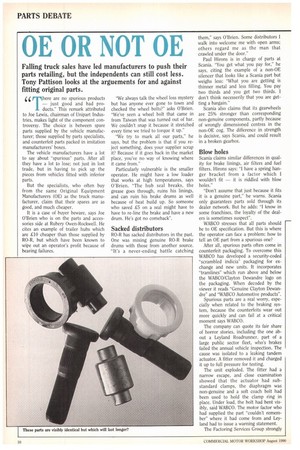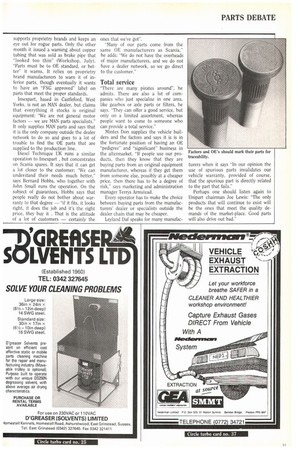OE OR NOT OE
Page 90

Page 91

If you've noticed an error in this article please click here to report it so we can fix it.
4 T g here are no spurious products — just good and bad products." This remark attributed to Joe Lewis, chairman of Unipart Industries, makes light of the component controversy. The choice is between spare parts supplied by the vehicle manufacturer; those supplied by parts specialists, and counterfeit parts packed in imitation manufacturers' boxes.
The vehicle manufacturers have a lot to say about "spurious" parts. After all they have a lot to lose; not just in lost trade, but in having to pick up the pieces from vehicles fitted with inferior parts.
But the specialists, who often buy from the same Original Equipment Manufacturers (OE) as the truck manufacturer, claim that their spares are as good, and much cheaper.
It is a case of buyer beware, says Joe O'Brien who is on the parts and accessories side at Rubery Owen-Rockwell. He cites an example of trailer hubs which are £10 cheaper than those supplied by RO-R, but which have been known to wipe out an operator's profit because of bearing failures. "We always talk the wheel loss mystery but has anyone ever gone to town and checked the wheel bolts?" asks O'Brien. "We've seen a wheel bolt that came in from Taiwan that was turned out of bar. We couldn't snap it because it stretched every time we tried to torque it up."
"We try to mark all our parts," he says, but the problem is that if you reject something, does your supplier scrap it? Because if it goes back in the market place, you've no way of knowing where it came from."
Particularly vulnerable is the smaller operator. He might have a low loader that works at high temperatures, says O'Brien, "The hub seal breaks, the grease goes through, ruins his linings, and can ruin his brake drums as well because of heat build up. So someone who saved £5 on a seal might have to have to re-line the brake and have a new drum. He's got no comeback".
Sacked distributors
R0-R has sacked distributors in the past. One was mixing genuine RO-R brake drums with those from another source. "It's a never-ending battle catching them," says O'Brien. Some distributors I walk into welcome me with open arms; others regard me as the man that crawled under the door."
Paul Hirons is in charge of parts at Scania, "You get what you pay for," he says, citing the example of a non-OE silencer that looks like a Scania part but weighs less: "What you are getting is thinner metal and less filling. You pay two thirds and you get two thirds. I don't think necesserily that you are getting a bargain."
Scania also claims that its gearwheels are 25% stronger than corresponding non-genuine components, partly because of wrongly dimensioned centres in the non-OE cog. The difference in strength is decisive, says Scania, and could result in a broken gearbox.
Blow holes
Scania claims similar differences in quality for brake linings, air filters and fuel filters. Hirons says: "I have a spring hanger bracket from a factor which I wouldn't fit — it is riddled with blow holes."
"Don't assume that just because it fits it is a genuine part," he warns. Scania only guarantees parts sold through its dealer network. But he adds: "I know in some franchises, the loyalty of the dealers is sometimes suspect".
WABCO stresses that all parts should be to OE specification. But this is where the operator can face a problem: how to tell an OE part from a spurious one?
After all, spurious parts often come in counterfeit packaging. To overcome this WABCO has developed a security-coded "scrambled indicia" packaging for exchange and new units. It incorporates "tramlines" which run above and below the WABCO/Clayton Dewandre logo on the packaging. When decoded by the viewer it reads "Genuine Clayton Dewandre" and "WABCO Automotive products".
Spurious parts are a real worry, especially when related to the braking system, because the counterfeits wear out more quickly and can fail at a critical moment says WABCO.
The company can quote its fair share of horror stories, including the one about a Leyland Roadrunner, part of a large public sector fleet, who's brakes failed the annual vehicle inspection. The cause was isolated to a leaking tandem actuator. A fitter removed it and charged it up to full pressure for testing.
The unit exploded. The fitter had a narrow escape, and close examination showed that the actuator had substandard clamps, the diaphragm was non-genuine and a soft coach bolt had been used to hold the clamp ring in place. Under load, the bolt had bent visibly, said WABCO. The motor factor who had supplied the part "couldn't remember" where it had come from and Leyland had to issue a warning statement.
The Factoring Services Group strongly supports proprietry brands and keeps an eye out for rogue parts. Only the other month it issued a warning about copper tubing that was sold as brake pipe that "looked too thin" (Workshop, July). "Parts must be to OE standard, or better" it warns. It relies on proprietry brand manufacturers to warn it of inferior parts, though eventually it wants to have an "FSG approved" label on parts that meet the proper standards.
Imexpart, based in Castleford, West Yorks, is not an MAN dealer, but claims that everything it stocks is original equipment: "We are not general motor factors — we are MAN parts specialists." It only supplies MAN parts and says that it is the only company outside the dealer network to do so and goes to a lot of trouble to find the OE parts that are supplied to the production line.
Diesel Technique UK runs a similar oporation to Imexpart , but concentrates on Scania spares. It says that it can get a lot closer to the customer; "We can understand their needs much better," says Bernard Hobbs, who together with John Small runs the operation. On the subject of guarantees, Hobbs says that people really do not bother about warranty to that degree — "if it fits, it looks right, it does the job and it's the right price, they buy it . That is the attitude of a lot of customers — certainly the ones that we've got".
-Many of our parts come from the same OE manufacturers as Scania," he adds: "We do not have the overheads of major manufacturers, and we do not have a dealer network, so we go direct to the customer."
Total service
"There are many pirates around", he admits. There are also a lot of companies who just specialise in one area, like gearbox or axle parts or filters, he says. "They can offer a good service, but only on a limited assortment, whereas people want to come to someone who can provide a total service."
Mintex Don supplies the vehicle builders and the factors and says it is is in the fortunate position of having an OE "pedigree" and "significant" business in the aftermarket. "If people use our products, then they know that they are buying parts from an original equipment manufacturer, whereas if they get them from someone else, possibly at a cheaper price, then there has to be a degree of risk," says marketing and administration manager Terrys Armstead.
Every operator has to make the choice between buying parts from the manufacturers' dealer or specialists outside the dealer chain that may be cheaper.
Leyland Daf speaks for many manufac
turers when it says "In our opinion the use of spurious parts invalidates our vehicle warranty, provided of course, that the spurious part is directly related to the part that fails."
Perhaps one should listen again to Unipart chairman Joe Lewis: "The only products that will continue to exist will be the ones that meet the quality demands of the market-place. Good parts will also drive out bad."












































































































